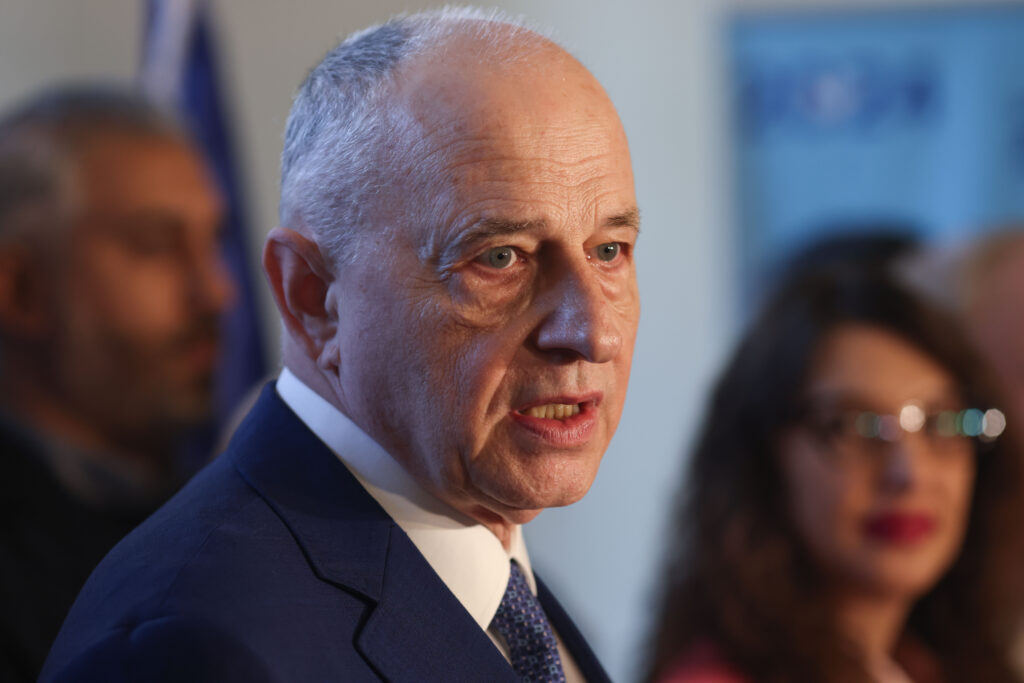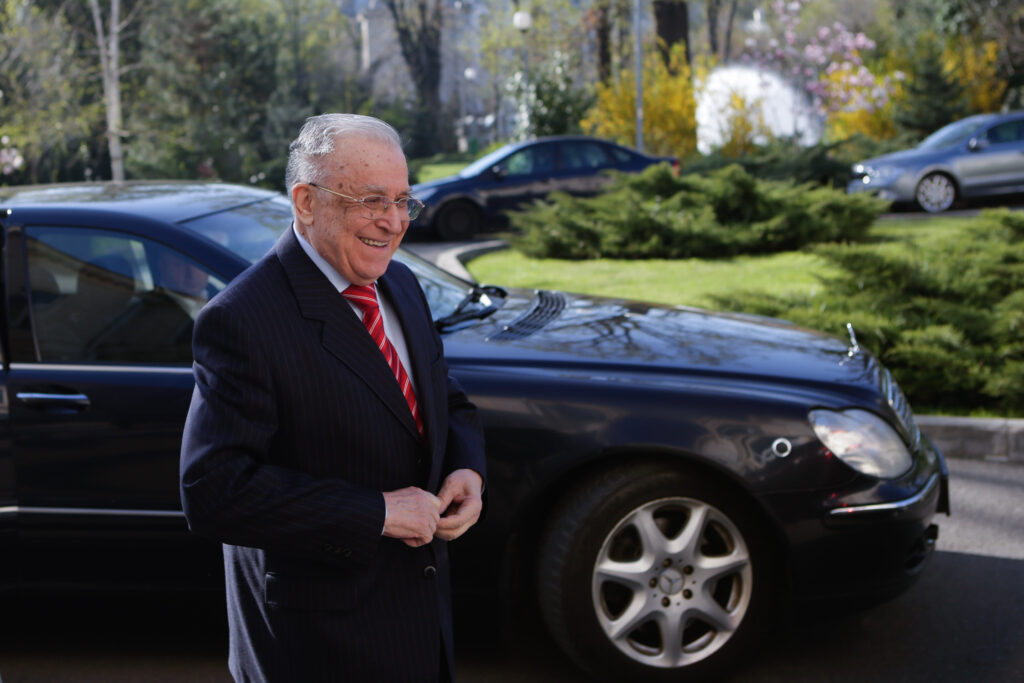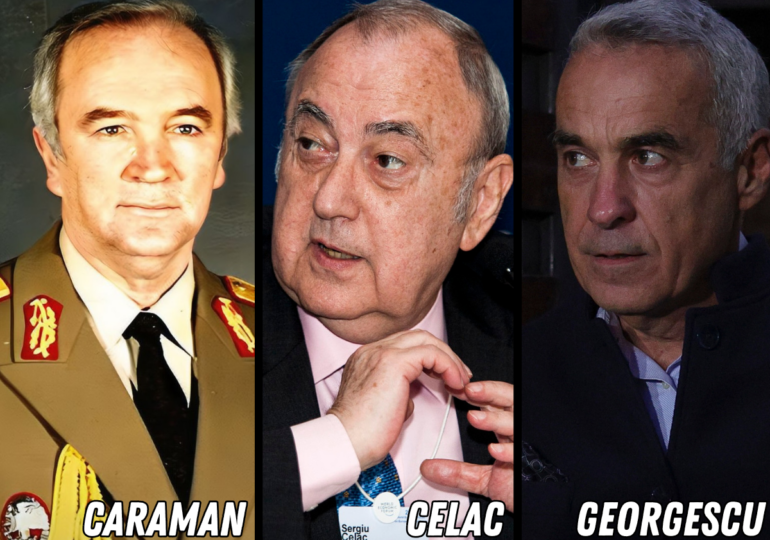On July 28, 2024, at the funeral of KGB spy Mihai Caraman, a wreath of flowers was photographed with the inscription: „Mihaela and Mircea Geoană, condolences.” At that time, the former NATO Deputy Secretary-General was the darling of opinion polls, being rated with the best chance to become the President of Romania.
„The political and electoral struggle has reached the lowest limits, and I will notify the Romanian state institutions about identity usurpation, staging, and dissemination of fake news,” wrote Mircea Geoană at the time in a Facebook post.
„A
"It seems to be part of a degrading political game. I trust that the Romanian state institutions will shed light on this matter, which affects not only my image but also the interests of the institution I represent," emphasized the former NATO official.

At that time, no one suspected that the wreath represented the first move in a chess game by shadowy actors who have now unleashed an unprecedented attack on Romania's stability.
After the events of the past few days, it is now clearer that the wreath of flowers was a direct message to Mircea Geoană that he had "betrayed the network" and would pay the price.
Mircea Geoană served as Minister of Foreign Affairs from 2000 to 2004, and in his last year in office, suddenly, Călin Georgescu, the current presidential candidate, appeared as his personal advisor.
"The metamorphosis of this man is interesting. When I met him, when I was Foreign Minister, at the Club of Rome, at the National Bank of Romania, deeply pro-Western, deeply pro-NATO and EU, interested in global issues, he made a good impression on me. And that's why, because I was on the UN Security Council and as Foreign Minister represented Romania there, I appointed him because he had the professional characteristics to be an honorary advisor on global issues," stated Mircea Geoană, after the information about the connection between the two candidates in the Romanian presidential elections surfaced.
All Threads Lead to DIE
Mihai Caraman died in July 2024, but not before witnessing a new Kremlin expansion westward, the onset of a hybrid war against the Western world, and a real one through Russia's military invasion of Ukraine.
He passed away at the age of 96, after living in seclusion in a villa in Cheia, Prahova, paradoxically, in a Romania that had become a pillar of NATO stability, an organization he had spied on in the Kremlin's name for a decade.
The legacy he left to Romania today bears a name - Călin Georgescu, and it is on the verge of causing the greatest political and social crisis in our country since the 1989 Revolution.
The agenda of the Supreme Council of National Defense meeting includes analyzing possible risks to national security posed by the actions of state and non-state cyber actors on IT&C infrastructures, supporting the electoral process.
Klaus Iohannis, President of Romania
All the threads behind the independent candidate who shocked a large part of public opinion at home and in the Western world, garnering over two million votes and winning the first round of the presidential elections, lead to DIE (Foreign Intelligence Directorate) from the communist era, a service infiltrated by the Kremlin.
Many DIE spies remained active even after 1990, grateful to the KGB, which significantly contributed to the downfall of Nicolae Ceaușescu's dictatorial regime.

Iliescu Sends a Signal to Moscow
For a decade, between 1958 and 1968, the Caraman network pilfered military documents from NATO offices and transferred them to the intelligence services of the Soviet Union.
"The beneficiaries of the information obtained through the Caraman network were both the leaders in Bucharest and the Soviet intelligence services," writes Florian Banu in his book "From SSI to SIE, a history of Romanian espionage during the communist regime (1948-1989)."
"According to available data, copies of the informative materials drafted by the DIE residency in Paris on NATO issues were sent to Moscow until 1964. Subsequently, only informative syntheses were sent to their Soviet counterparts," further wrote researcher Florian Banu in his book.
Shortly after the fall of Nicolae Ceaușescu's regime, on January 18, Ion Iliescu, as head of state, appointed Mihai Caraman as Deputy Minister of National Defense, a position held at the time by General Nicolae Militaru, a Kremlin influence agent in Romania.
The big issue is how did 2 million people end up voting for an unknown, but that's no longer the Constitutional Court's concern. First and foremost, it's the Permanent Electoral Authority's task to find out the funding source. Mr. Georgescu told us he didn't spend a single penny, showing zero expenses.
Traian Băsescu, former President of Romania
Caraman quickly rose to head the CIE (Foreign Intelligence Center), the new name given after the Revolution to the former DIE, later renamed SIE.
Iliescu's decision, himself a Romanian politician with strong ties to Moscow, to appoint an "enemy" of Western states to lead Romanian intelligence was a political statement of confidence to Moscow, a guarantee that our country would not escape the Kremlin's influence.
An Emanation of the Network
Călin Georgescu is a creation of the Caraman network within Romania, which has spread to government institutions and agencies, controls and influences groups of retirees from the Army and former Securitate, conducts business, and is politically involved, being present throughout the past decades in decision-making and influential circles of society.
Sergiu Celac, former translator for Nicolae Ceaușescu, becomes Romania's Minister of Foreign Affairs immediately after the fall of the communist regime and remains in office until June 28, 1990.
During this time, he worked directly with Mihai Caraman on "reconfiguring the intelligence service, integrating the agency's first covered budget into the MAE organizational chart," as shown in an article published by the investigative site Captura.
Călin Georgescu worked for years in Celac's shadow, revolving around the latter during his tenure as ambassador to the UK from December 20, 1990, to 1996.
Additionally, Călin Georgescu became a member of the Club of Rome, where Sergiu Celac held the position of vice president.
At Mihai Caraman's funeral in July, Teodor Meleșcanu, former Minister of Foreign Affairs and significant political leader, Nicolae Ulieru, the first spokesperson of the SRI, Stelian Nistor, actor, Bartolomeu Săvoiu, retired general and high-ranking Freemason, and others attended the event, shedding light on some of those who had been associated with Caraman and his associates over time.
Călin Georgescu: Romania's Only Chance Lies in Russian Wisdom
Presidential candidate Călin Georgescu is a product of this shadowy world, populated by former Securitate agents, former spies who worked for the Kremlin, influence agents who maintained ties with Moscow even after the Soviet Union's collapse in 1991.
Russia's current strategy is evident in almost all of Călin Georgescu's actions and statements: "Romania's only chance lies in Russian wisdom," declared the candidate, who won the first round of the presidential elections.
The fact that political leaders have announced that Călin Georgescu's entire campaign was funded from abroad shows that Romania is the victim of an unprecedented attack, on the brink of becoming a victim of the hybrid war unleashed by Russia in Europe.
"You're asking me something obvious, which I know, and you know too. It's a system, I don't know how legal it is, I understand how the system was used. Now, the funding source needs to be tracked," stated Marcel Ciolacu, PSD leader, the major runner-up in the presidential elections.
"None of the parties have done this because the law sets limits on online spending. The money used in what happened is much more than what is provided for by law, which means that the source of funding was external. I am not a prosecutor or a judge, it's not my job, it's the job of other authorities, another power in the Romanian state," Marcel Ciolacu announced.
The Mistake at the Bucharest Bar
Călin Georgescu's personal advisor is lawyer Doru T. Costea. He is a well-known professional at the Bucharest Bar, involved in many civic activities.
He has defended many journalists sued by those criticized in press articles. Additionally, he announced on his Facebook page that he offers his legal services for free to the victims of sexual assaults by Professor Alfred Bulai.
According to SpotMedia sources, lawyer Costea worked or collaborated for at least a short period of time with the Foreign Intelligence Service during Nicolae Ceaușescu's era.
Contacted by phone, he denied the information but did not explain what he did, starting from 1981 when he declared he finished Law School, and at least until 1983 when he joined the Bucharest Bar.
"It's a mistake at the Bucharest Bar," Mr. Costea said, without providing further explanations, disturbed by the media attention in recent days, after the first round of the presidential elections.
Youth readers should know that during the communist regime, immediately after completing a form of education - vocational, high school, or college - the graduate received a job assignment, being obliged to work.
If they did not "enter the labor force," they were liable to arrest for vagrancy, trial, and conviction to forced labor or imprisonment.
A Form of Desperation
The fact that one of the most comprehensive, powerful, and influential secret networks in Romanian society has come to light and invested hundreds of millions of euros to bring a fascist, anti-Semitic candidate under the influence of the Kremlin to lead Romania shows a form of desperation on Moscow's part.
The hybrid attack of a foreign power on our country, of an intensity not seen since the Revolution of 1989, indicates that Russia is using all weapons and resources to destabilize Romania, a strategic component for the security of NATO's eastern flank and the protection of Moldova.

